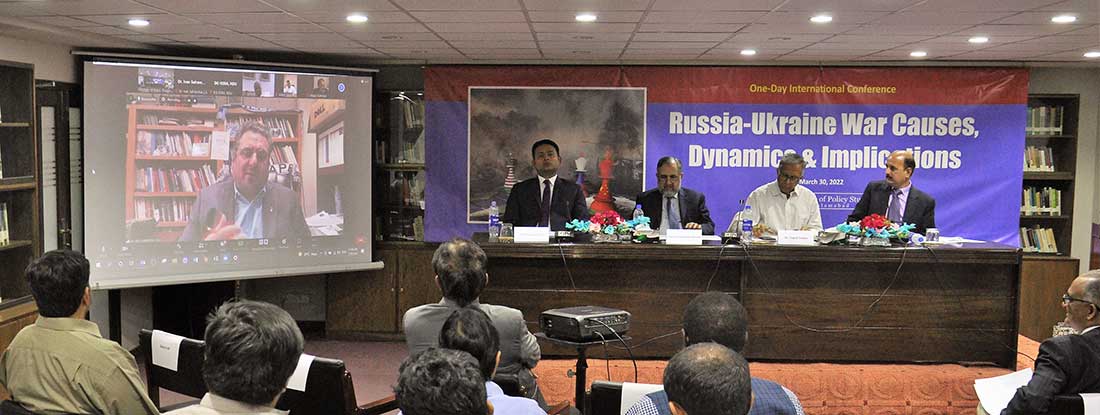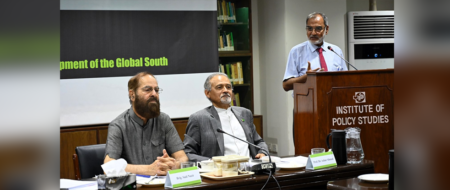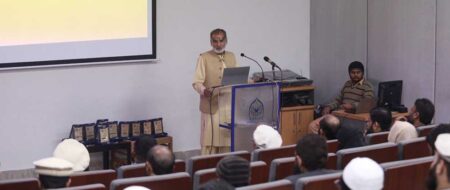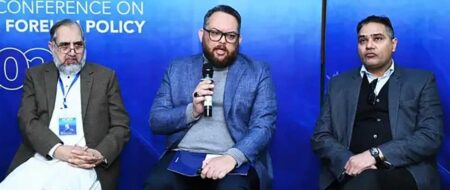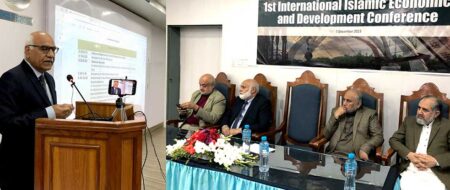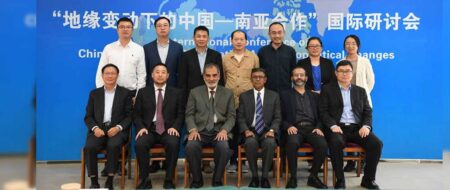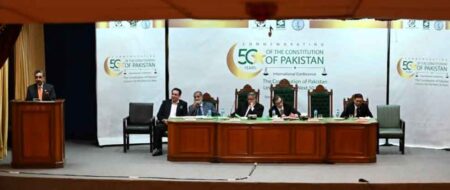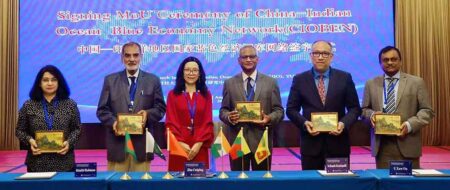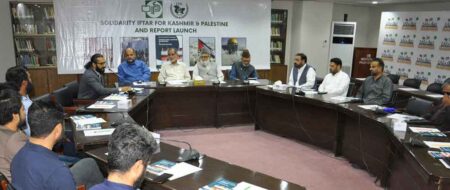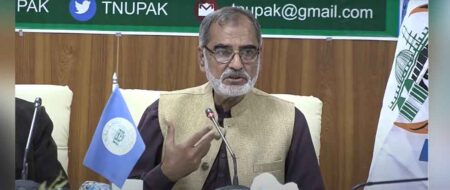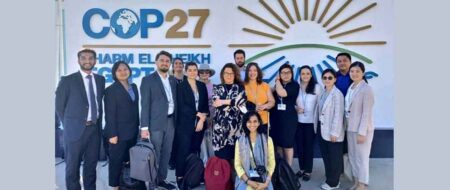Russia-Ukraine War: Causes, Dynamics and Implications
Experts warn Russia-Ukraine war has risked credibility, future of the World Order
The Russia-Ukraine conflict has not only created a worldwide political, diplomatic, economic, food and energy crisis but has also exposed the double standards of the world powers towards the principles of international politics and global governance.
This was stated by experts at a One-Day International Conference on “Russia-Ukraine War: Causes, Dynamics and Implications” organized by IPS on March 30, 2022.
The international speakers of the conference included Dr Ivan Safranchuk, director, Centre for Euro-Asian Studies, MGIMO University, Moscow, Dr Akis Kalaitzidis, professor of international relations at University of Central Missouri, Prof Zhang Jiegen, executive director, Pakistan Study Centre, Institute of International Studies, Fudan University, and Iliya Kusa, IR Analyst, Ukranian Institute for the Future, Kyiv.
Leading Pakistani academics, diplomats, security and foreign policy analysts including IPS’ Chairman Khalid Rahman, Dr Syed Rifaat Hussain, Ambassador Zamir Akram, Ambassador Masood Khalid, Dr Asma Shakir Khawaja, Dr Khurram Iqbal, Syed Muhammad Ali, Ambassador Syed Abrar Hussain, Ambassador Zamir Akram, Brig (r) Dr Tughral Yamin, Brig (r) Dr Attique Ur Rehman, and Brig (r) Said Nazir also shared their insights on the conflict and its global, regional and local implications.
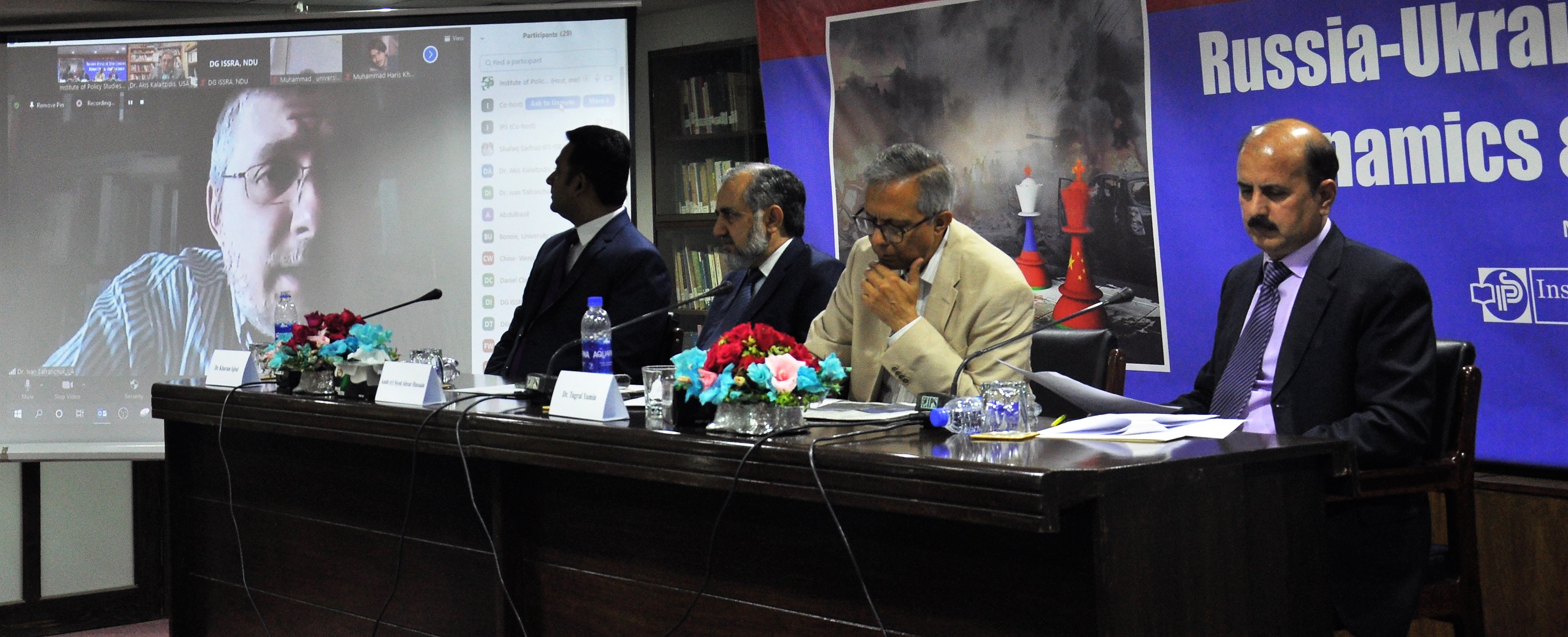
Some of the speakers expected the conflict to be a long-drawn-out affair. This is reinforced by the fact that despite the inclination of the Russian leadership or military to end the war at an early stage, on the ground trends in the shape of military armament and around 50,000 non-state actors in Ukraine offer a very alarming specter.
The war is not a choice but perhaps a strategic compulsion that Moscow felt for a number of reasons like challenges ranging from the global world order to expansion of NATO and also concerns regarding the political leadership of Ukraine and its policies.
For the US, the speakers viewed, it is an ideational conflict that shows the level of violence and degree of pain and cost that could be inflicted on Russia by the US-led western alliance. The war seems to be a grave miscalculation on Russia’s part because the ability of the western world to cause pain in an enduring fashion across several domains beyond the kinetic tactical or operational battlefield of Ukraine will make it very difficult for Moscow to sustain and achieve its objectives.
The speakers said China views this conflict with a lot of concern because it offers more challenges than opportunities. A weakened Russia is not in Chinese interest. Moreover, the revival and rearmament of NATO also indirectly does not augur well for Beijing in terms of future prospects. Another aspect is that although China wants to sustain its global economic growth but not at the cost of disturbing its trade relations with the west.
The speakers also highlighted the buildup of the Quad, the Indo-Pacific strategy and the recent rise of QUAD 2.0. If all these are added up most of these things are aimed at containing China and disrupting its global rise. This conflict has perhaps reminded Washington that they cannot afford to only concentrate the major share of their hard power only on Asia-Pacific and need to maintain their security commitment towards the west and Europe as well.
In the regional context, India was seen in a flux because its military forces are heavily dependent on Russia for meeting its technological and operational needs but it is facing a very difficult challenge due to its growing diplomatic and economic ties with the US. As such Delhi will find it rather difficult to balance these contrasting challenges.
The Muslim world was urged to introspect because they have been accused for over 20 years of terrorism but this reality dawning in eastern Europe allows them to look at how other civilizations and value systems call upon non-state actors and militant organizations when they are challenged and how they are presented in the western-dominated media.
An analysis of the entire specter of the Ukraine war presented during the conference showed that it is simultaneously playing out in five domains: identity, society, economy, politics, and security.
In terms of identity it poses a simultaneous challenge in terms of race, religion, and nationalism. The western alliance sees this as the frustration of the Russian orthodox Christianity facing the challenge of the western world order which is characterized by the Protestants and Catholics.
The societal aspect should be seen in the context of globalization and the perpetual process of the interconnectedness of the different civilizations, societies, peoples, cultures and economies. This is perhaps the biggest challenge globalization has received in terms of a counter-globalization movement.
The economy aspect is not just playing out in the sanctions regime but also in the trade and currency wars, and the grave concern that Beijing has because to sustain its economic expansion and global influence it is heavily dependent on western Europe and America for maintaining its export market which is worth over $600 billion. The increasing energy prices pose a huge challenge for the developing world and the governments, especially immediately after the Covid crisis.
In the political domain, it is the greatest test of the current world order and a complex contest between the ideational powers, revivalist powers and states that want to be identified on the basis of nationalism. It is an ideational challenge to the status quo world order by a frustrated and provoked Russia which wants to be respected by virtue of its economic, political and strategic revival.
In terms of security domain, the conflict has led to the revival and rearmament of NATO, which does not augur well for China and Russia. It also has reduced Russian energy leverage and soft power on western Europe and revived sub-conventional warfare as a means of great power contest in the east European theater.
While chairing the second session of this Conference, Chairman IPS Khalid Rahman said that this conflict has exposed the inherent duplicity within the world order in which Western aggression of Muslim countries is justified and tolerated but not against the Western world.
Ambassador Zamir Akram was of the view that Russia is angered by the eastward expansion of NATO and has challenged the Western-led world order. He also said that Western sanctions could affect Pakistan’s ability to benefit from improving ties with Moscow, in terms of meeting its energy needs.
In his concluding remarks Prof Dr Rifaat Hussain said that the people of Ukraine who are suffering due to this conflict deserve international sympathy and support.
Ambassador Abrar Hussain, Vice Chairman IPS said that Ukraine conflict has created a worldwide economic, energy and food crisis which has affected all the countries including Pakistan.
Dr Khurram Iqbal of National Defence University argued that this conflict represents a Russian challenge to the US exceptionalism which the Western world is contesting by supporting the Ukraine government through militants which presents the world an opportunity to recover from its excessive focus on the Muslim world.
Russian scholar Dr Ivan Safranchuk stated that the Western powers cannot have one set of rules for themselves and another for other countries in terms of security and prosperity and Russia is no longer willing to access this contradictory Western approach.
US expert Dr Akis Kalaitzidis described the Ukraine War as an ideational conflict for the US which should not merely be seen in geopolitical context while Russia, through this military operation, wants to show the world that it is back on the world stage.
Chinese Professor Zhang Jiegen said that this conflict offers more challenges than opportunities for Beijing and although the Western powers view China as standing on the Russian side but a weakened Russia is not in Chinese interests.
Dr Asma Shakir Khawaja was of the view that India faced a complex dilemma of maintaining its very close defence cooperation with Russia and simultaneously building deep and long term strategic and diplomatic ties with the United States.
Ambassador Masood Khalid stated that Beijing favors a peaceful settlement, acknowledges complex history of Ukraine and does not support the use of force or sanctions. He further said that China shares the Russian distrust of the Western powers but views this conflict with concerns due to its negative security and economic implications for Beijing.
Syed Muhammad Ali stated that despite economic and geopolitical challenges the Ukraine conflict offers a strategic relief for China because now the Western powers will find it difficult to concentrate their hard power posture only against Beijing in Asia-Pacific and now they will also have to improve their security commitments towards Europe.
Dr Bakare Najimdeen argued that Muslim societies should start thinking of alternative arrangements, such as a monetary union and common market, in order to address their concerns during international crises.
Ukrainian scholar Iliya Kusa claimed that Russia has largely failed and will never be able to achieve its objectives of the War, which he termed as a ‘misadventure’.
Brigadier (Retd) Dr Attique-ur-Rehman said that world banking system and global energy supply chain has badly suffered due to this conflict. He said that more than one trillion dollars have been stuck in the global banking system due to the war.
The international conference was attended by a large number of diplomats, scholars, security experts and students in person as well as online from across the world.


